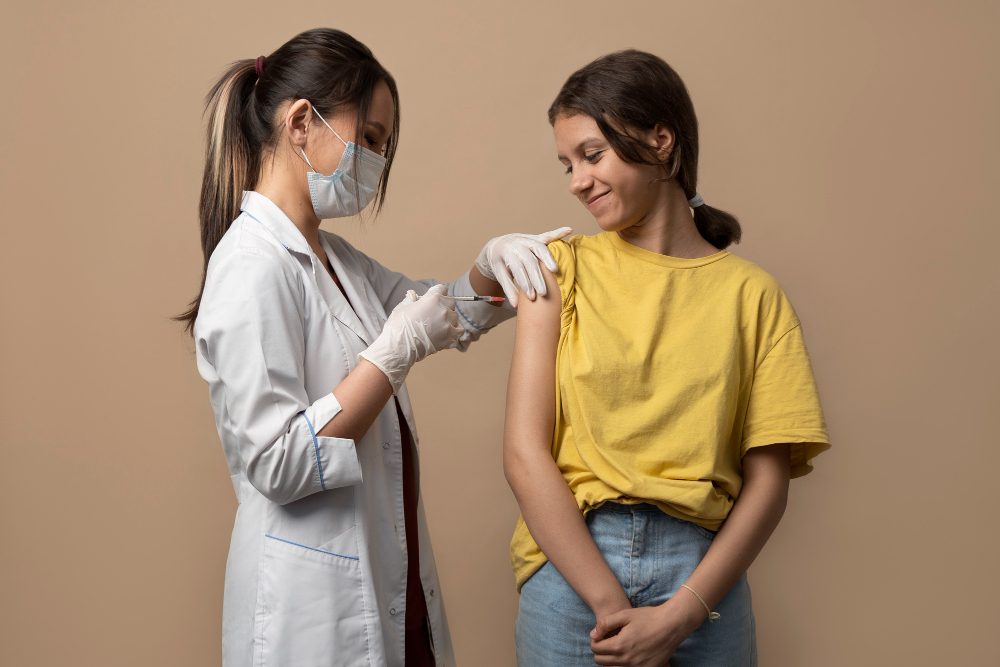Measles Vaccination: Debunking Myths and Facts
Measles, once considered a largely eradicated disease, has made a return in recent years due to the spread of vaccine misinformation. The resurgence of measles cases highlights the critical importance of measles vaccination in safeguarding public health. In this blog, we’ll delve into the facts and myths about measles vaccination, with a specific focus on the MMR (Measles, Mumps, and Rubella) vaccine as a powerful tool against measles.
Understanding Measles
This is an extremely contagious viral illness that primarily affects children but can infect people of any age. It is transferred through respiratory droplets and can spread rapidly in crowded environments. The initial signs of measles include:
- Cough
- Fever
- Runny nose
- Red eyes
While most people recover from measles without complications, it might cause severe complications such as pneumonia, encephalitis (swelling of the brain), and even death.
The impact of measles on global health is significant, particularly in vulnerable populations with limited access to healthcare. According to WHO, in 2019, there was an approximate 207,500 measles-related deaths worldwide, mostly among children under the age of five.
The MMR Vaccine: A Powerful Tool Against Measles
The MMR vaccine is a mixture vaccine that provides protection against measles, mumps, and rubella. It is administered in two doses, usually given between 12-15 months of age and between 4-6 years of age. The MMR vaccine is highly successful in preventing measles infection. According to thе CDC, thе MMR vaccine can prevent measles with just onе dosе in 93% of people, but two doses can prеvеnt the disease in 97% of people.
The MMR vaccine works by stimulating the immune system to produce antibodies that recognize and fight against the measles virus. By introducing an inactivated and weakened form of the virus into the body, the vaccine helps the immune system learn how to respond effectively to a real measles infection.
Debunking Measles Vaccine Myths
Myth 1: Measles is a harmless childhood disease.
One common myth surrounding measles is the notion that it is a benign childhood illness. While it is true that many individuals recover from measles without complications, the disease can have serious consequences. In fact, before the widespread use of the measles vaccine, measles was a leading cause of childhood mortality worldwide.
Myth 2: Measles vaccination causes autism.
One of the most enduring vaccine-related myths is the claim that the MMR vaccine leads to autism. This belief originated from a study published in 1998, which has since been discredited and retracted due to serious methodological flaws and ethical concerns. Numerous subsequent studies involving large populations have found no affirmation of a causal link between vaccines, including the MMR vaccine, and autism.
Scientific consensus strongly supports the safety of the MMR vaccine. Major health organisations, such as the WHO, CDC, and the American Academy of Pediatrics, highlight that the advantage of vaccination far outweighs any potential risks.
Myth 3: Natural immunity is better than vaccine-induced immunity.
Another misconception is the idea that natural immunity acquired through measles infection is superior to vaccine-induced immunity. While recovering from measles does provide immunity, relying solely on natural immunity has significant drawbacks.
Firstly, measles is a highly contagious disease, and acquiring natural immunity often involves enduring the symptoms, potential complications, and risks associated with the infection. Vaccination, on the other hand, offers a safer and more controlled way to develop immunity without the associated risks.
Secondly, natural immunity acquired through infection does not confer lifelong protection against measles. In contrast, the immunity acquired through vaccination is long-lasting and provides a more reliable shield against the disease.
Measles Facts
Measles Fact 1: The MMR vaccine is safe and well-studied.
Extensive research and testing have been directed to ensure the safety and efficacy of the measles vaccine. Before any vaccine is approved for public use, it goes through rigorous clinical trials to evaluate its safety and effectiveness. The measles vaccine has been in use for several decades and has a well-established safety record. Like any medical intervention, vaccines can have some side effects, but they are generally mild, such as soreness at the injection site or a low-grade fever.
Measles Fact 2: Vaccination protects individuals and communities.
High vaccination coverage is crucial in preventing measles outbreaks. Vaccination not only safeguards vaccinated individuals but also contributes to herd immunity. Herd immunity occurs when a significant portion of the population is immune to a disease, making it difficult for the disease to spread. This protection is especially vital for those who are unable to receive the vaccine due to medical reasons or age, such as infants or individuals with compromised immune systems.
Measles Fact 3: Measles elimination is possible through vaccination.
Measles can be eliminated and even eradicated with effective vaccination programs. Several countries, including the United States, have successfully eliminated indigenous measles transmission. The global effort to eradicate measles is ongoing, aiming to eliminate the disease from all countries and regions.
Conclusion
Measles vaccination is a crucial public health measure that has proven to be highly successful in preventing the spread of measles. Debunking myths about measles vaccination is essential to ensure accurate information reaches the public. The MMR vaccine is safe, well-studied, and plays a vital role in protecting individuals and communities from measles. By promoting vaccination and countering misinformation, we can work towards a future free from the threat of measles outbreaks and their devastating consequences.
It is imperative to consult reputable sources and healthcare professionals for reliable vaccine information to make informed decisions regarding vaccination. Together, we can safeguard public health and protect future generations from the preventable suffering caused by measles.
If you need more information about measles, consult an expert paediatrician today!
